2021 NAEd/Spencer Spring Retreat Speakers and Mentors
Ujju Aggarwal, The New School

Ujju Aggarwal is an Assistant Professor of Anthropology and Experiential Learning in the Schools of Public Engagement and an affiliate faculty member in Global Studies and the Department of Anthropology. Her research examines questions related to public infrastructures, urban space, racial capitalism, rights, gender, and the state.
She is currently completing her first book, The Color of Choice: Raced Rights, the Structure of Citizenship, and Inequality in Education, a historically informed ethnography of choice as it emerged in the post-Civil Rights period in the United States. Her work has appeared in popular outlets, scholarly journals, and edited volumes including Transforming Anthropology, Scholar & Feminist Online, Educational Policy, and Feminists Rethink the Neoliberal State: Inequality, Exclusion, and Change (edited by Leela Fernandes). She is co-editor (with Edwin Mayorga and Bree Picower), of What’s race got to do with it? How current school reform policy maintains racial and economic inequality 2nd Edition (Peter Lang, 2020); and co-editor (with Linta Varghese and Rupal Oza) of Women’s Studies Quarterly Fall/Winter 2019.
Prior to joining The New School, she was Visiting Joanne Woodward Chair in Public Policy at Sarah Lawrence College. She has been a Visiting Scholar at the Vermont Center for Fine Arts and has also taught at Hunter College (CUNY) and Educational Opportunities Center (SUNY). Her research has been supported by the Institute for Urban Policy Research and Analysis (UT Austin), the National Academy of Education/ Spencer Foundation, the Center for Place, Culture and Politics (CUNY Graduate Center), and the Davis Putter Fund.
In addition to her academic training, Ujju also brings a long history of working to build local and national organizations that work for educational justice, immigrants’ rights, and transformative justice as well as projects that focus on the intersection of arts and social justice, popular education, and adult literacy. She has served as the Co-Chair for the K-16 Committee of the American Studies Association and currently serves on the Board of Teachers Unite, on the Advisory Board Member of the Parent Leadership Project (Bloomingdale Family Head Start Center, PLP), and as an Advisory Board Member of PARCEO (Participatory Action-Research Center for Education Organizing).
Elizabeth Albro, Institute of Education Sciences
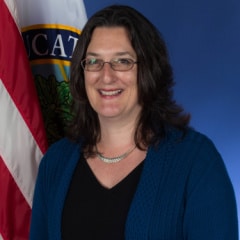
Elizabeth Albro is the Commissioner of the Teaching and Learning Division at the Institute of Education Sciences (IES). Her focus of professional expertise is building bridges between basic science and education practice. Trained in the behavioral and social sciences, with an emphasis on psychology, cognition, and communication, she brings expertise in the basic sciences of learning to education practice. Since 2002, she has been part of IES, the independent research arm of the U.S. Department of Education. She sought to integrate basic and applied work initially as an AAAS/SRCD Policy Fellow, then as a program officer overseeing several research grant portfolios, in her current role as Associate Commissioner of Teaching and Learning and in her past role as Acting Commissioner of Education Research. She had an early hand in building the Cognition and Student Learning, and Reading and Writing research portfolios. Recently, she has played a role in several large scale research efforts, including the National Research and Development Centers on Cognition and Science Instruction, and on Cognition and Math Instruction, as well as in the Reading for Understanding Research Initiative. Prior to joining IES, Dr. Albro was a faculty member at two liberal arts colleges, Whittier College and Wheaton College (Norton, MA). Her desire to build bridges was clear during her faculty tenure – at Whittier, she was a Child Development faculty in the Department of Education, while at Wheaton, she was a member of the Psychology Department. At both colleges, her responsibilities included preparing students who intended to be PK-12 teachers. Her goal was to ensure that her students knew what we currently understood about how children learn, and to make sure that these students had the skills they would need to continue to learn about learning once they were in the classroom. All of her work in teacher preparation was grounded in her own experience as a preschool teacher in Cochabamba, Bolivia.
Megan Bang, Spencer Foundation/Northwestern University
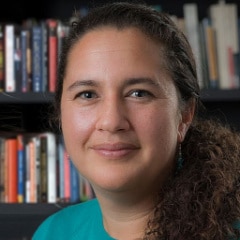
Megan Bang is the Senior Vice President of the Spencer Foundation and is also a Professor of the Learning Sciences and Psychology at Northwestern University. Dr. Bang’s research focuses on understanding culture, learning, and development broadly with a specific focus on the complexities of navigating multiple meaning systems in creating and implementing more effective learning environments in science, technology, engineering, arts, and mathematics education. Megan approaches her work through rigorous mixed methods – utilizing experimental design in her foundational cognition and development studies, to community based participatory design work in which she co-designs learning and teaching with communities, families, and youth as well as engages in the collaborative study of such environments. She conducts research in both schools and informal settings. She has taught in and conducted research in teacher education as well as leadership preparation programs. Dr. Bang has won several awards including the AERA early career award in Indigenous Education as well as the Division K early career award in Teaching and Teacher Education. She has published in leading outlets such as Cognition & Instruction, Science Education, and Educational Psychologist. She is currently serving on the Board of Science Education at the National Academy of Sciences and the editorial boards of several top journals.
Leah Bricker, Spencer Foundation
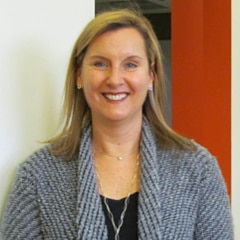
Leah Bricker started her career as a middle school science teacher before serving as the State Science Coordinator at the Indiana Department of Education, where she was involved in all aspects of K-12 science education (e.g., standards, assessments, professional development, partnerships among science education stakeholders in the state). Leah then served as a Senior Program Associate at the American Association for the Advancement of Science’s Project 2061, where she helped design and facilitate professional development programs for K-12 science teachers across the country. She also worked on a project focused on STEM assessments and their alignment to learning goals. Leah earned her PhD in the Learning Sciences at the University of Washington in 2008. She was involved in science teacher education at both Loyola University Chicago and The University of Michigan as an Assistant Professor. Leah is currently also a Research Associate Professor at Northwestern University in the School of Education and Social Policy. She studies youths’ STEM-related learning pathways over time and across contexts (e.g., home, school, afterschool, neighborhoods, museums) using qualitative methods and design-based research.
Claudia Buchmann, The Ohio State University
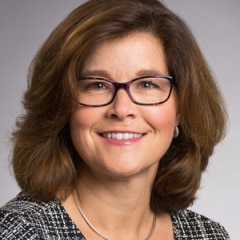
Claudia Buchmann is a Distinguished Professor of Sociology at The Ohio State University. Dr. Buchmann focuses on comparative and international sociology, social stratification, education, gender, race and ethnicity. Her current research focuses on gender, race and class inequalities in education in the United States and internationally, with a particular focus on the growing female advantage in college completion. Her prior research includes cross-national and comparative studies of the impact of economic policies and institutional forces on educational outcomes and social well-being and case studies of stratification and mobility in Africa. She has served as deputy editor of the American Sociological Review and chair of the Sociology of Education Section of the American Sociological Association.
Hala Ghousseini, University of Wisconsin-Madison
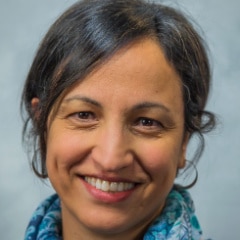
Hala Ghousseini is the John Grover Harvey Professor of Math Education and associate professor in the Department of Curriculum and Instruction at the University of Wisconsin-Madison. Her scholarship focuses on understanding the nature of mathematics teacher learning and the design aspects of professional education that support the learning and enactment of ambitious practice. Professor Ghousseini received her Ph.D. from the University of Michigan-Ann Arbor. She has several years of experience teaching elementary and middle school mathematics.
Jenny Irons, William T. Grant Foundation
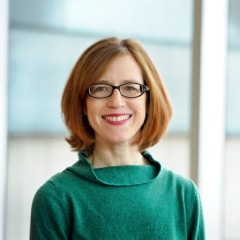
Jenny Irons is an Associate Program Officer at the William T. Grant Foundation. Jenny joined the Foundation in 2018 as Associate Program Officer. She serves as a key member of the Foundation’s Senior Program Team, which sets the Foundation’s research agenda and annual priorities, and helps to manage the Foundation’s funding programs on reducing inequality.
Jenny brings experience from higher education and evaluation research to the Foundation. From 2003 to 2013, she was Associate Professor of Sociology at Hamilton College. Her research and teaching focused on race, gender, and social movements, and she published peer-reviewed articles, essays, and a book, Reconstituting Whiteness: The Mississippi State Sovereignty Commission. After leaving Hamilton, Jenny directed qualitative evaluation research as a senior research analyst at The Policy & Research Group in New Orleans. As a research consultant, she conducted a summative evaluation for the Greater New Orleans Foundation (GNOF) of their post-Hurricane Katrina Community Revitalization Fund, a $23 million affordable housing initiative created by GNOF in partnership with local and national foundations. She has also worked in academic administration at centers for women’s leadership at Tulane University and Rutgers University. Jenny earned her Ph.D. in sociology from the University of Arizona and her B.A. in sociology-anthropology from Millsaps College.
Grace Kao, Yale University

Grace Kao is Chair and IBM Professor of Sociology and Professor of Ethnicity, Race, and Migration (Secondary appointment, by courtesy). She is also Faculty Director of Education Studies. She is also Director of the Center for Empirical Research on Stratification and Inequality (CERSI).
She is Past Vice-President of the American Sociological Association.
She studies race, ethnicity, and immigration as they collectively relate to education and relationships among young people. She also has interests in the effects of migration on young people and has written papers on these topics in Mexico, China, and Spain. Currently, she is one of a team of researchers (led by Hyunjoon Park) that is examining the transition to adulthood among Korean Millennials. More recently, she has developed interests in the Sociology of Music and K-Pop in particular. Her work has been published in the American Sociological Review, Annual Review of Sociology, Social Science Research, Social Science Quarterly, American Education Research Journal, Teachers College Record, Child Development, Early Childcare Research Quarterly, Population Research and Policy Review, Population and Development Review, among others. Her research has been supported by NICHD, The Spencer Foundation, The Russell Sage Foundation, and the Academy of Korean Studies.
Formerly, she was Professor of Sociology, Education, and Asian American Studies at the University of Pennsylvania, where she taught for 20 years. She is the Co-Editor (with Hyunjoon Park) of Research in the Sociology of Education. She has served on the Boards of the Population Association of America and the Association for Asian American Studies. In addition to serving as Past Vice-President of the American Sociological Association, she has served as Council member for the Sections of Asia/Asian America and Sociology of Education, and she has served as Chair of the Section of Children and Youth, and served on ASA’s Nominations Committee. She has also served or currently serves on the Editorial Boards of the American Sociological Review, NYU Press’ Series on Asian American Sociology, Social Science Quarterly, Social Science Research, Social Psychology Quarterly, Sociological Forum, Sociological Perspectives, Social Problems, and Socius.
According to Google Scholar, her work has been cited over 11,000 times.
Preeya Pandya Mbekeani, Spencer Foundation

Preeya Pandya Mbekeani studies educational inequality, with a focus on postsecondary access and completion for low-income and minoritized students. In her recent work, she has examined socioeconomic disparities in college enrollment and completion and in parental behaviors thought to be associated with educational attainment. Her work also evaluates programs and policies aimed at reducing income- and race-based inequality in higher education access and completion. Preeya earned her doctorate in Quantitative Policy Analysis in Education at the Harvard Graduate School of Education where she was a doctoral fellow in the Multidisciplinary Program in Inequality and Social Policy. She holds a master’s degree from the Harvard Graduate School of Education and a bachelor’s degree from the University of Chicago. Prior to beginning her doctoral studies, Preeya worked at the Massachusetts Department of Elementary and Secondary Education. She began her career as a high school teacher, and she spent several years as a counselor in a college access program.
Jeana Morrison, Spencer Foundation
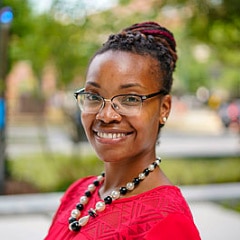
As a former Program Director and Counseling Coordinator for Upward Bound, Jeana Morrison has always let her passion for working with youth of color ground and direct her work. To that end, her research examines the ways in which higher education, policy, and race collide to create particular experiences for Black students across the African diaspora. She is interested in understanding how access and equity policies are implemented transnationally, paying particular attention to how post-secondary student understandings and critiques can contribute to policy making processes. Prior to joining Spencer, Jeana was an inaugural AACTE/Holmes Postdoctoral Associate at the Boston University Wheelock College of Education & Human Development. She loves music, international travel, and her hometown of Philadelphia. Jeana received her Ph.D. from the Drexel University School of Education.
Carla O’Connor, University of Michigan
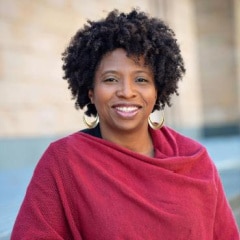
Carla O’Connor is the Director of University of Michigan Wolverine Pathways, a free year-round program that partners with the families, schools, and communities of Detroit, Ypsilanti, and Southfield to support academic success, college admission, and career exploration. She is also Professor of Education and an Arthur F. Thurnau Professor at the University of Michigan. She received an M.A. and Ph.D. in Education from the University of Chicago and a B.A. in English from Wesleyan University. A sociologist of education, Carla O’Connor has expertise in the areas of African American achievement, cultural studies, urban education, and ethnographic methods.
Her work includes examinations of how Black identity is differentially constructed across multiple contexts and influences educational outcomes; how Black people’s perceptions of opportunity vary within and across social space and shape academic orientation; how Black educational resilience and vulnerability is structured by social, institutional, and historical forces; and how the organization and culture of schools influence students’ social and academic identities and outcomes. She is currently conducting a study on race and the co-construction of family-school relations in one demographically diverse elementary school. Her work has been published in the American Educational Research Journal, Educational Researcher, Sociology of Education, Review of Research in Education, Teaching and Teacher Education, and Ethnic and Racial Studies. She co-edited (with Erin McNamara Horvat) the book, Beyond Acting White: Reframing the Debate on Black Student Achievement and has contributed to multiple handbooks and edited volumes that contend with issues of educational inequality and access. She is a founding member of the NSF sponsored Center for the Study of Black Youth in Context.
OiYan Poon, Spencer Foundation
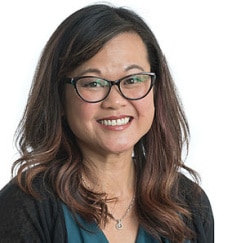
OiYan Poon’s research agenda brings together organizational theories and race and ethnic studies to study selective admissions processes, affirmative action policies, and the racial politics of Asian Americans and education. In her research, she has utilized a range of methods and approaches including critical discourse analysis, narrative inquiry, constructivist grounded theory, community-based participatory research methods, and GIS spatial analysis. As a public scholar, she is a lead co-author of amicus briefs submitted on behalf of social scientists supporting race-conscious admissions in SFFA v. Harvard. Prior to joining Spencer, Dr. Poon was an Associate Professor in the School of Education at Colorado State University. Currently, she is an Associate Professor Affiliate in the Department of Educational Policy Studies at the University of Illinois at Chicago. She earned a Ph.D. in Education with a certificate in Asian American Studies from UCLA and an M.Ed. in College Student Affairs Administration from the University of Georgia.
Julie Posselt, University of Southern California
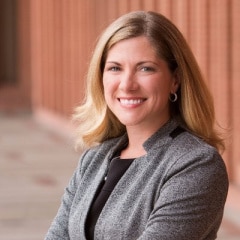
Julie Posselt is an associate professor of higher education in the USC Rossier School of Education and was a 2015-2017 National Academy of Education/ Spencer Foundation postdoctoral research fellow. Rooted in sociological and organizational theory, her research program examines institutionalized inequalities in higher education and organizational efforts aimed at reducing inequities and encouraging diversity. She focuses on selective sectors of higher education— graduate education, STEM fields, and elite undergraduate institutions—where longstanding practices and cultural norms are being negotiated to better identify talent and educate students in a changing society.
Derek Taira, University of Hawaii
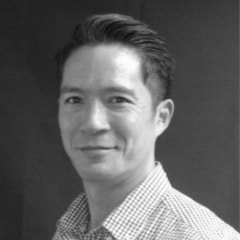
Derek Taira is an assistant professor of history and educational policy at the University of Hawaiʻi at Mānoa and comes from a long line of public school teachers. He teaches courses on the histories of education in Hawaiʻi and America, the politics of education, and multicultural education. He earned his Ph.D. in history and educational policy studies from the University of Wisconsin-Madison in 2016. His research focuses on the social and cultural experiences of Native Hawaiians in American schools during the first half of the twentieth century. Central to his research and teaching is an effort to promote historical awareness of the complex ways schools have been both contested sites of conflict and spaces of opportunity for marginalized communities.
Terri Wilson, University of Colorado Boulder
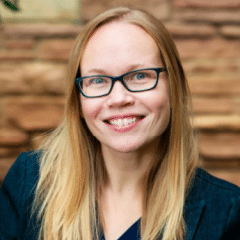
Terri S. Wilson is an Assistant Professor in the School of Education, in the Educational Foundations, Policy and Practice (EFPP) area. Her research interests focus on the connections between philosophy of education and education policy; in particular, the relationship between our individual choices (and rights and interests) in education, and how those choices intersect with the ‘public goods’ of education, including equity, justice and democratic participation. She is currently working on three main projects:
The first is a book, “How Different Should Schools Be? Choice, Recognition and Justice in Education,” which explores how we might balance the interests of families to choose specific or distinctive school missions (e.g., a charter school focused on a particular language or culture) with arguments for a common, integrated school system. In connection with this project, she has also written about the conceptual foundations of how school choice ‘works’ as a policy, and questions that choice raises about the public purposes of education.
Second, building on her previous research on charter school marketing and the organizational contexts of choice, she is studying an emerging group of “intentionally diverse” charter schools. These schools attempt to leverage choice for integration, but also raise intriguing questions about the meaning, purpose and potential commodification of diversity.
Third, she is continuing a collaborative project that explores recent activism to “opt out” of state assessments, and how this movement raises longstanding philosophical questions about the proper scope of state and family authority over the provision of education. Across these different projects, Wilson remain interested in exploring how philosophy offers methodological resources for exploring the moral and ethical dimensions of education.
Wilson has been at CU Boulder since 2015, and teach courses in philosophy of education, education policy and research methodology (including EDUC 5726: Disciplined Inquiry, EDUC 7055: Philosophy of Education, EDUC 7446: Policy Issues in Education and EDUC 8250: Qualitative Research I). In 2018, she taught a newly designed course: the MA Capstone Writing Seminar. She previously taught at Southern Illinois University Carbondale, and was a 2012-2014 National Academy of Education/ Spencer Postdoctoral Scholar. Wilson completed her PhD at Teachers College, Columbia University, and previously worked for the St. Paul Public Schools, and with different community engagement and organizing initiatives in Minnesota.
